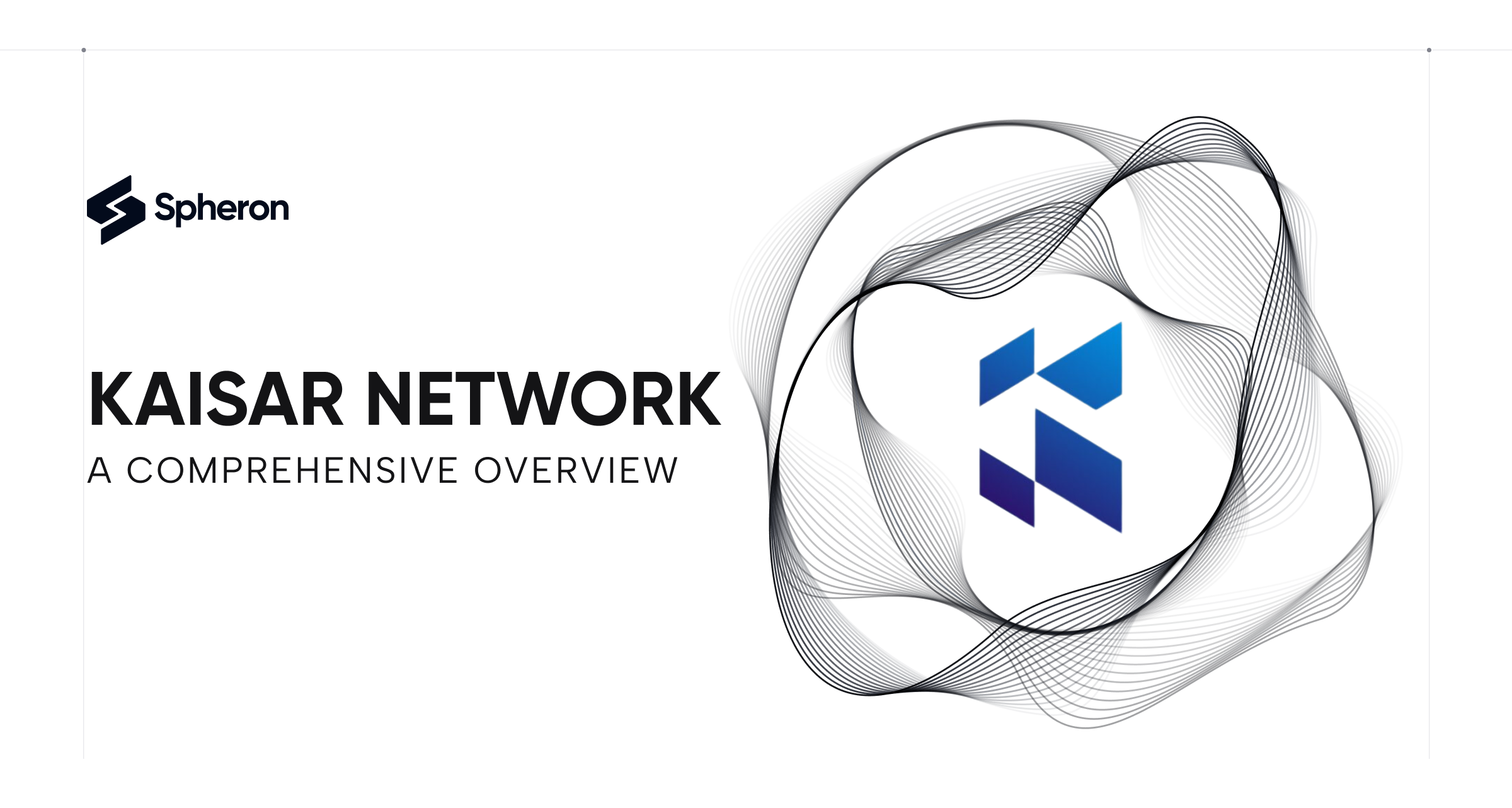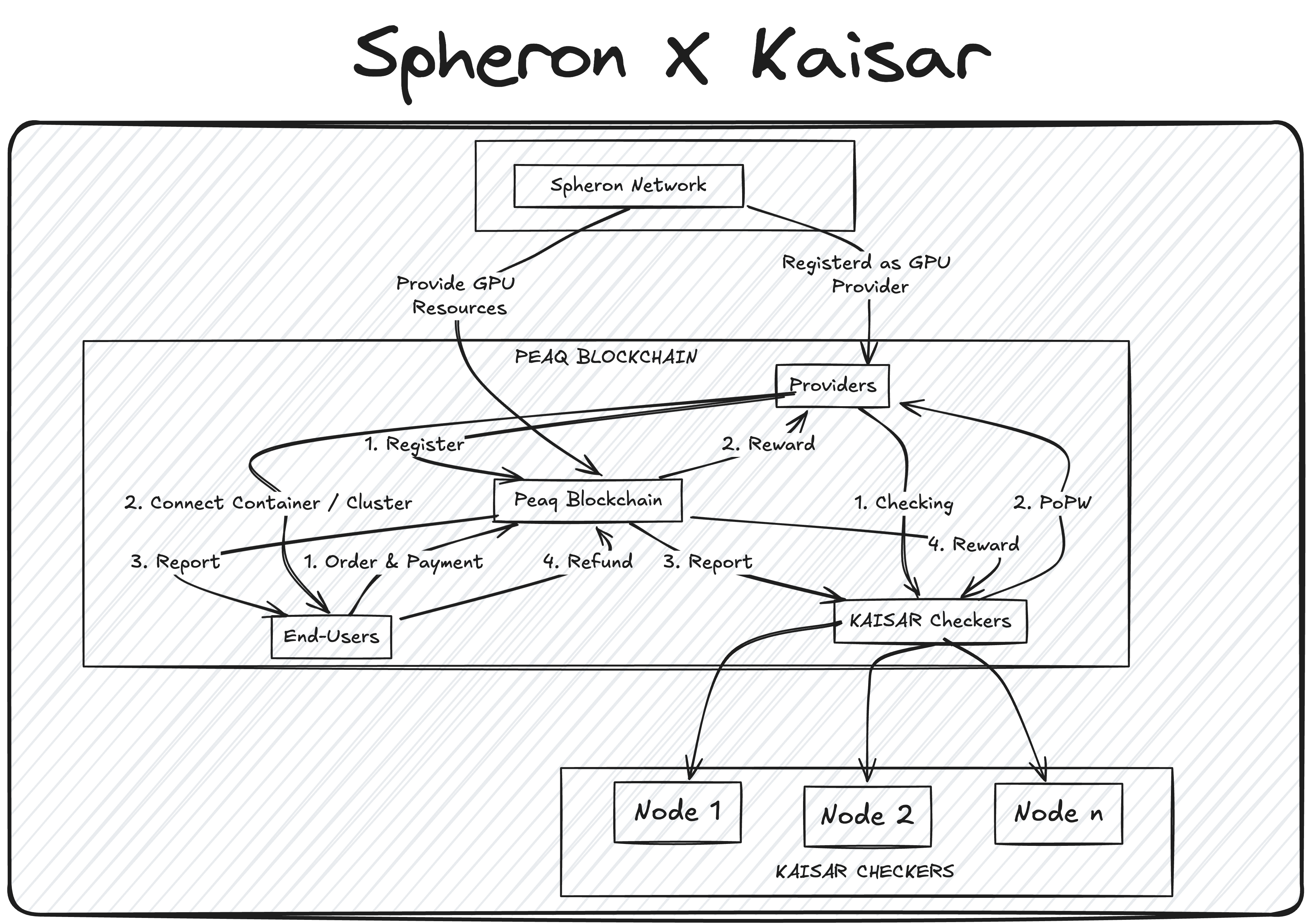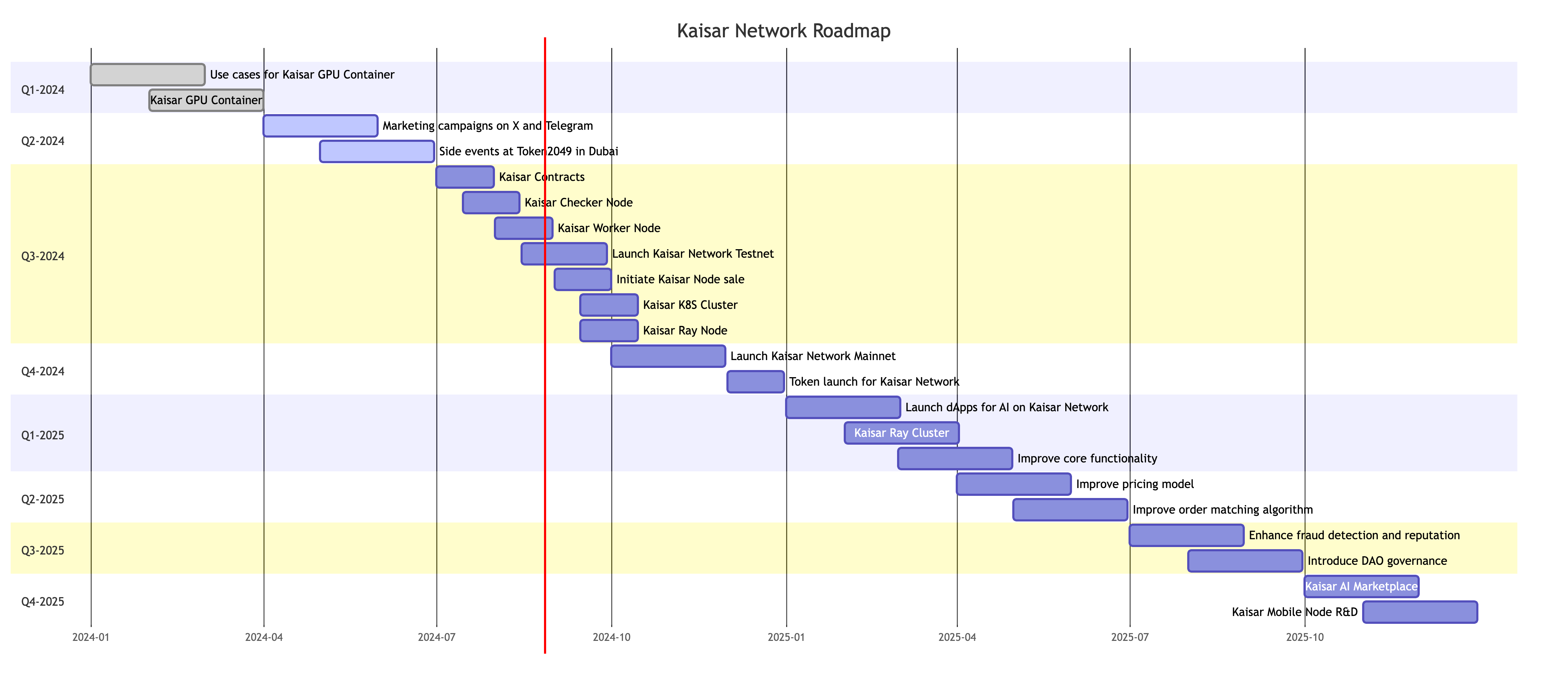Kaisar Network: A Comprehensive Overview
 Spheron Network
Spheron NetworkTable of contents
- Leading the DePIN Market
- Behind the Technology: How Kaisar Operates
- Architecture
- Roles in Kaisar Network
- The KAI Token: Powering a Decentralized Compute Economy
- Token Emission Plan
- Kaisar Network Roadmap
- The Kaisar Core Team and Future Plans
- Strategic Partners and Incubation Support
- Spheron X Kaisar Network: Partnership for a Global GPU Breakthrough
- Kaisar Network Launched Exciting Airdrop Campaign

Since the public introduction of LLM and AI chatbot technologies in 2023, the demand for high-performance computing has skyrocketed. A detailed analysis of the training compute requirements (measured in FLOPs) of significant machine learning systems reveals a dramatic increase in computational needs. Between 1952 and 2010, compute requirements doubled every 18 months. However, between 2010 and 2022, this doubling time accelerated to just six months. From late 2015 to 2022, a new trend of large-scale models emerged, with compute needs starting two to three orders of magnitude above previous levels, exhibiting a ten-month doubling time.
As the competition for processing power intensifies among companies and nations, many overlook the vast potential of underutilized processors scattered across the globe, already connected to the Internet and ready for use.
Kaisar is at the forefront of this innovative DePIN movement, developing a Layer 1 (L1) interoperable blockchain with fast, low-cost transaction speeds, ideally suited for DePIN projects. Complementing this, Kaisar offers a DePIN platform with pre-built container templates that simplify the training and scaling of custom AIs based on some of today's most advanced models.
Leading the DePIN Market
Kaisar employs Proof of Physical Work technology, with governance facilitated by its native KAI token. This system rewards machines that contribute processing power and DePIN builders who generate transactions on the network, fostering a decentralized, positive-sum economy.
As an L1 solution, Kaisar's blockchain is fully decentralized, with a robust consensus mechanism to prevent fraud. The network supports micropayments for transaction fees and provider rewards, enabling anyone to join by simply downloading the Kaisar app, bypassing cumbersome application processes.
Kaisar distinguishes itself from competitors by being an L1 network seamlessly compatible with the Ethereum Virtual Machine (EVM). Unlike many competitors operating on Layer 2 (L2) solutions, Kaisar’s network is Polkadot-enabled and supports cross-chain machine IDs with Cosmos, Solana, and Binance and bridges to Ethereum. Moreover, it connects to over 30 blockchains via Wormhole, offering best-in-class interoperability.
From a user's perspective, scalability is crucial whether they are selling compute cycles or developing a DePIN product. Kaisar’s network can process over 100,000 transactions per second (TPS), with transaction costs as low as $0.00025.
Kaisar also provides a comprehensive suite of modular, ready-to-use DePIN functions. These include self-sovereign machine IDs, seamless payment processing for machines, data storage and verification, data indexing, and autonomous AI agents, ensuring that DePIN projects and dApps have all the tools they need to operate effectively.
Behind the Technology: How Kaisar Operates
Kaisar’s network, powered by its blockchain, offers a secure and efficient platform for customers seeking affordable computational power. These customers can access processing power from providers who earn rewards for sharing the unused cycles of their processors.
Customers specify their requirements — such as processor type, geographic location, and bandwidth — to create a compute cluster and submit their request to Kaisar’s smart contract. Once payment is made using KAI tokens, the smart contract identifies suitable devices and automatically sets up the cluster. After deployment, detailed information about the cluster is sent to the customer, who can connect and use it.
The process is straightforward for providers looking to share their processors and earn rewards. After installing tools to monitor device information (e.g., CPU/GPU type, bandwidth, and RAM), the device is verified and registered with Kaisar’s smart contract. The device is then made available on the Kaisar Network to execute jobs. Activity reports are sent to Kaisar, and the smart contract compensates the provider based on a predefined algorithm.
Rather than a centralized cloud service company mediating the relationship between customers and providers, the Kaisar blockchain facilitates direct, secure connections. The device contract manages the registration and operation of CPU/GPU devices, the cluster manager contract approves customer orders and deploys clusters, and the emission contract handles provider rewards. Users can extend cluster usage, deregister devices, or raise technical issues as needed.
Architecture
Kaisar Network's architecture is a cohesive, multi-layered structure that delivers a seamless, secure, and efficient user experience. Each layer has a distinct role and works in tandem to ensure optimal system performance. The architecture is built on modern technology, ensuring scalability, reliability, and robustness.
Workflow
1. Checking: The Checker sends a job request to verify the uptime and performance of the Worker.
2. PoPW (Proof of Physical Work): The Provider executes the job and sends proof of work to the Checker.
3. Report: The Checker reports the parameters and performance data of the Providers to the blockchain.
4. Reward: At the end of each epoch, the system issues rewards to Providers and Checkers based on performance and honesty.
Components
Blockchain: Kaisar leverages peaq blockchain, a multi-chain layer one blockchain specifically designed and optimized for DePIN. The network can scale beyond 100,000 transactions per second (TPS) (pending upgrade) while maintaining a minimal transaction cost of approximately $0.00025. Peaq utilizes the most environmentally friendly blockchain architecture and boasts the second-largest developer ecosystem in Web3. Peaq enables seamless interaction with Polkadot, cross-chain machine IDs with Cosmos, Solana, and Binance, and connection to Ethereum. peaq blockchain is EVM compatible and connected to over 30 blockchains through Wormhole.
Kaisar Checker: As a Checker Node, Kaisar Checker is responsible for assessing the uptime, bandwidth, and performance of physical devices provided by Providers within the VPN network. Upon completion of tests, Checkers transmit proof of device functionality to Kaisar Blockchain. Periodically, Kaisar Blockchain evaluates Checker performance and efficiency to allocate rewards.
End-users: End-users are those seeking to rent GPUs within the Kaisar Network. They directly engage with Kaisar Blockchain to access GPU rental, payment processing, and cancellation features.
Providers: Providers offer CPU/GPU physical devices for the Kaisar Network. These devices interact with the Kaisar Blockchain to execute various functions, including device registration and reward retrieval.
Roles in Kaisar Network
Kaisar Network integrates three essential roles for its operations: Container, Manager, and Checker.
Container: These act as specialized computers that handle heavy computational tasks, including validating transactions, displaying digital content, and providing remote rendering services. These tasks are performed in real-time, which is essential for a seamless cloud experience.
Manager: This role facilitates the connection between users and Containers, helping them select and use the most suitable Containers for different application requirements.
Checker: Checkers evaluate the performance and service quality of Containers by continuously monitoring them to ensure they operate correctly and effectively.
The KAI Token: Powering a Decentralized Compute Economy
In an era where meme tokens can be created with minimal effort, the KAI token will launch with significant utility. KAI is the native utility token of the Kaisar ecosystem, a multifaceted asset designed not only for transactions but also for incentivization, governance, and platform development. With a total supply of 1 billion tokens, Kaisar has meticulously strategized its allocation to ensure optimal ecosystem growth and balance stakeholders' short—and long-term interests.
The KAI native token plays a multifunctional role in the ecosystem:
Transaction utilities: KAI serves as the standard medium of exchange in Kaisar. KAI tokens are used for transactions within the Kaisar Network and its AI cluster system. Customers use KAI tokens to pay for computing resources, and providers receive KAI tokens in return for offering those resources.
Incentives and rewards: Providers, Checkers, Validators, and future contributors earn KAI tokens for their contributions to the network, ensuring active participation and maintaining the system's integrity. This reward mechanism encourages continuous involvement and support from the community, driving the network's growth and efficiency.
Governance: Token holders are empowered to propose, discuss, and vote on platform changes, ensuring Kaisar maintains its decentralized character.
Staking: New node operators who want to contribute to the Kaisar ecosystem must stake KAI tokens as an initial commitment. In addition to demonstrating commitment, staked KAI tokens safeguard against potential wrongdoing. Node operators engaging in fraudulent practices that violate Kaisar Network's standards or experiencing errors that affect the system risk having their staked KAI tokens partially or completely forfeited.
Token Emission Plan
The token rewards within the network are distributed with the creation of each block, benefiting Providers, Validators, and Nominators over 12 years. This reward system is structured around a deflationary model, which adjusts every 10,512,000 blocks, roughly corresponding to four years. Initially, the reward rate is set at 15 KAI per block for the first four years.
This will then be reduced to 13 KAI for the following four years and 11 KAI for the last four years. This reduction will continue until the total emission reaches its cap of 1,000,000,000 KAI. After this limit is reached, rewards will shift to being funded by transaction fees, compensating Validators and Nominators, and cluster rental fees, which will reward Providers and Checkers.
Kaisar Network Roadmap
The Kaisar Core Team and Future Plans
Verena Ng **- Chief Marketing Officer (CMO)**As a co-founder of Bigcoin and a seasoned crypto professional since 2018, Verena has been instrumental in shaping the PR and marketing strategies for various successful crypto projects.
Conal Luu **- Chief Research & Development Officer (CRDO)**With over 8 years of experience in software development, Conal has a strong background as the former Blockchain Lead at Kaopiz Software and Famtech Global, driving innovative solutions in the blockchain space.
Vu Le **- Chief Executive Officer (CEO)**Currently the CEO of X-OR Cloud, Vu brings a wealth of experience from his previous roles as Chief Innovation Officer (CIO) at CMC Telecom and Head of CMC Cloud, where he led transformative cloud initiatives.
Leonie Nguyen **- Chief Business Development Officer (CBDO)**Leonie has over 7 years of expertise in driving business growth, co-founding and supporting numerous AI and blockchain startups across Europe, with a focus on innovation and strategic partnerships.
Dzung Hoang **- Chief Technology Officer (CTO)**With more than a decade of experience in Cloud Computing and Telecom Services, Dzung has held the position of Technology Director at CMC Cloud, where he led cutting-edge technological advancements.
Phuong Pham **- Chief Operating Officer (COO)**Phuong brings over 10 years of experience in IT and Business Development. As the founder and CEO of Famtech Technology JSC, she has successfully led numerous projects, combining business acumen with technological innovation.
Blake Vo **- Chief Growth Officer (CGO)**As the COO of Famtech Technology JSC, Blake has extensive experience in business growth and development, playing a key role in scaling operations and driving market expansion.
Nam Nguyen **- Chief Compliance Officer (CCO)**Nam currently serves as the Project Director of X-OR Cloud. He has a strong background as the former Vice Director of the Vietnam Institute of Digital Economy Development, where he specialized in digital transformation and compliance.
Kaisar is preparing to unveil more details about its project soon. For now, the focus remains on developing every aspect of the network. A live demo of the customer-facing site is already available, and a provider tools demo is coming soon. The Kaisar blockchain is nearing its test net deployment, with the main net launch and KAI token generation event to follow shortly thereafter.
Strategic Partners and Incubation Support
Kaisar's success is built on strategic partnerships with industry leaders, including major technology firms and established brands from various sectors. These partnerships, crucial to the network's infrastructure, have been secured without the involvement of major Web2 companies.
Kaisar’s growth has been significantly supported by incubators such as the HashKey Group and WXblockchain’s Future3 Camp. Their backing has empowered the Kaisar team to innovate and build a network with the potential to revolutionize the world of computing and AI.
The Kaisar team looks forward to sharing more updates as their roadmap progresses. Interested parties can follow Kaisar on X for the latest developments and join their Telegram channel.
Spheron X Kaisar Network: Partnership for a Global GPU Breakthrough

Spheron Network and Kaisar partnership is set to transform the decentralized physical infrastructure landscape. By integrating Spheron’s secure and scalable decentralized compute platform with Kaisar’s innovative Decentralized Physical Infrastructure Network (DePIN), this collaboration aims to redefine global GPU resource allocation. Spheron will provide its GPU resources to the Kaisar network, enhancing the availability and diversity of computing power for AI, ML, and other compute-intensive applications.
Also, Spheron will join as a GPU provider within its ecosystem, expanding Spheron’s and Kaisar's market reach and enabling seamless access to cost-effective, high-performance compute solutions. This strategic alliance tackles GPU scarcity and drives a more efficient, decentralized, and accessible global computing environment, paving the way for the next generation of AI and DeFi advancements.
Kaisar Network Launched Exciting Airdrop Campaign
Kaisar Network announced the triumphant completion of its Kaisar Genesis NFT mint, which saw an impressive 888 participants within just 2 hours. Building on this momentum, Kaisar Network introduced the Kaisar Airdrop Campaign, an engaging program to reward its dedicated community members.
This campaign offers a unique opportunity for users to deepen their involvement with the Kaisar Network and earn rewards through a series of interactive activities, including:
Social Farming: Participants can complete tasks on the Kaisar platform to accumulate points.
Product Testing: Details will be provided in upcoming updates.
Introducing the Kaisar Airdrop Portal
Recognizing that many enthusiastic community members had limited opportunities to participate in the NFT mint, Kaisar Network has launched the Airdrop Portal. This platform is designed to reward early supporters and community pioneers from the outset.
To begin this rewarding journey, users are encouraged to visit the Airdrop Portal at https://kaisar.io/airdrop/. There, they can claim relevant badges and accumulate points, which will contribute to future airdrop rewards.
Earning Rewards in the Kaisar Airdrop Campaign
The Kaisar Airdrop Portal offers two primary ways for users to earn rewards: by claiming badges and accumulating points. Both methods contribute to a participant’s overall score, enhancing their chances of securing a larger share of the airdrop.
1 — Claim Badges
Badges serve as a recognition system, rewarding users for their dedication to the Kaisar community. The more badges a participant collects, the more rewards they unlock. Badges can be earned through various activities, including:
Kaisar NFT Holders: Ownership of a Kaisar Genesis NFT automatically grants a badge.
Kaisar Hero or Fan Roles: Active participation in the Kaisar Discord server can earn these special roles.
Kaisar OGs: Participants who ranked in the top 20 on leaderboards from previous Galxe, Zealy, or QuestN campaigns can claim this badge.
Kaisar Network will regularly update the available badges, so participants are encouraged to stay tuned for future announcements.
2 — Accumulate Points
Points play a crucial role in the overall reward system, and participants can accumulate them in several ways:
Complete Tasks on Galxe: Kaisar Network has partnered with Galxe to offer a variety of engaging tasks that earn participants points. These tasks can be accessed through the Galxe platform.
Refer Friends: Each friend referred to the portal through a participant’s link earns them 200 points. The referral count is updated daily on the portal.
Daily Check-In: Participants can earn points by checking in daily. The point accumulation starts at 10 points on day 1 and increases progressively to 70 points by day 7. The progress resets if a streak is broken, so consistent check-ins are key.
Boosting Earnings with Multipliers
In addition to claiming badges and accumulating points, participants can unlock exclusive multipliers to significantly amplify their rewards. Kaisar Network offers the following multipliers:
Hold a Kaisar Genesis NFT: Kaisar NFT holders enjoy a 3x multiplier at the end of the campaign, and eligibility is determined through daily snapshots.
Participate in Events: Participants can unlock exclusive point bonuses by engaging in events hosted by Kaisar’s partners and key opinion leaders (KOLs).
There are two ways to qualify for these event bonuses:
Previous Campaign Participants: Participants in previous Galxe, QuestN, or Zealy campaigns can connect their wallets to the Kaisar Portal to receive a lifelong 50% bonus on their points.
Winners of Partner and KOL Events (Future): Upcoming events such as AMAs and contests will offer participants the chance to win a lifelong 50% bonus on their points. Eligibility can be checked by connecting a wallet to the Kaisar Portal.
Participants who hold a Kaisar Genesis NFT and qualify for an event bonus can receive both multipliers, resulting in a potential 3.5x boost in daily points. With additional opportunities, multipliers can be combined to reach a maximum 10x boost, significantly increasing participants’ chances of earning substantial rewards.
Start Your Farming Journey Today
Kaisar Network encourages participants to claim badges, accumulate points, and take full advantage of the available multipliers to maximize their airdrop rewards. To ensure fairness, Kaisar Network will conduct a Sybil check to filter out fraudulent wallets, ensuring that loyal users are rewarded based on their genuine contributions.
Kaisarians can start their journey by visiting https://kaisar.io/airdrop/ and begin farming rewards today!
Subscribe to my newsletter
Read articles from Spheron Network directly inside your inbox. Subscribe to the newsletter, and don't miss out.
Written by

Spheron Network
Spheron Network
On-demand DePIN for GPU Compute
